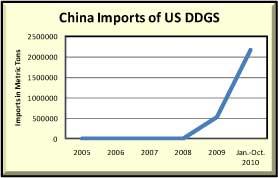The U.S. Grains Council has helped almost 70 U.S. companies register as interested parties to China’s anti-dumping investigation against imports of U.S. origin distiller’s dried grains with solubles (DDGS).
USGC President and CEO Thomas C. Dorr called the Chinese investigation “surprising,� saying that it could be disruptive to trade but the Council encourages a positive resolution to the investigation.
The first step in the case involves helping DDGS producers register as interested parties, a process that must be completed no later than Jan. 17 in Beijing (which is Jan. 16 in the United States) and is further complicated by the need to translate all registrations into Chinese.
“By working to coordinate registrations, we can help our members handle the short turn-around and help the U.S. industry as a whole provide a more coordinated response,� explains Rebecca Bratter, USGC director of trade development.
The Council’s goal is to encourage a resolution that focuses on the long-term U.S.-China trade relationship, according to Bratter. “For the Council’s part, we intend to operate as normal in China and continue our trade relationship despite whatever happens in this case.�
Registering as an interested party is an important step, since registered parties can qualify for lower, negotiated tariffs if there is a finding in the investigation. In contrast, unregistered companies could face the highest tariffs of all.
Once the registration process is complete, Chinese authorities will begin a fact-finding process that will include investigations of specific company practices.
To reach a final ruling against the U.S. trade, China must show evidence that DDGS has been dumped in the Chinese market at prices below what other buyers pay and that Chinese interests have been injured by the dumping.
Provisional tariffs on DDGS could begin as early as June 2011. China is expected to make a decision on its findings by Dec. 28, 2011, though that deadline can be extended by six months if needed.
DDGS is a feed co-product derived from ethanol production. As U.S. ethanol production has increased, so has the availability of DDGS. At the same time, China’s need for high-protein feed ingredients increased sharply, and Chinese livestock producers solved some of their protein needs by increasing DDGS purchases.
As a result, U.S. shipments to China skyrocketed from almost nothing three years ago to more than 2 million metric tons in 2010 and may reach as much as 3-5 million tons in 2011.
Dorr noted that China’s economic growth over the past two years has meant new patterns in trade for products like DDGS.
“It should not be surprising that there would be an adjustment period in response to China’s unprecedented demand,� Dorr said.
The U.S. Grains Council has conducted market development programs in China for 25 years, including extensive education on DDGS use.


